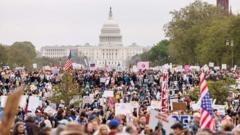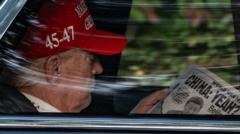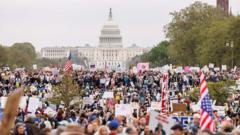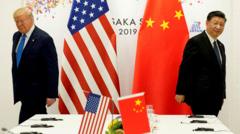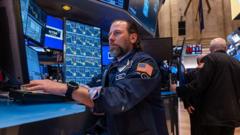Amid economic turmoil and political setbacks, Trump's efforts on trade, foreign policy, and immigration are facing mounting pressures, revealing vulnerabilities in his second-term agenda.
**Trump's Tariff Strategy Faces Economic Turbulence and Political Uncertainty**
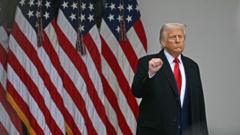
**Trump's Tariff Strategy Faces Economic Turbulence and Political Uncertainty**
As Trump's new tariffs shake markets, his broader agenda confronts serious challenges.
In announcing sweeping tariffs on U.S. imports, Donald Trump declared April 2 as America's "liberation day," yet the aftermath suggests a collision with economic reality. The stock market saw significant declines following Trump's announcement, as U.S. trading partners including Canada, the European Union, and China prepared to retaliate against the proposed tariffs. The political climate has shifted, reflecting uncertainty about the effectiveness of Trump's policies.
The White House atmosphere this past week hinted at growing anxiety. Security measures were heightened in anticipation of large protests against Trump's agenda, and communication from administration officials became scarce, indicative of a potential crisis management phase. Trump, however, retains a firm belief that his tariff strategy will ultimately revive the manufacturing sector, asserting that the temporary market turmoil will give way to long-term economic growth.
The repercussions of Trump's tariff strategy extend beyond trade. His foreign policy initiatives, particularly regarding Israel and Ukraine, are becoming increasingly complicated. Conflict in Gaza escalated with Israel's renewed military actions, undermining the ceasefire Trump had promoted prior to taking office. Meanwhile, Russian conditions for a ceasefire in Ukraine appear to prolong the conflict, raising doubts about the efficacy of Trump's diplomatic approach.
Legal obstacles also threaten Trump's immigration enforcement agenda. Despite high public support for his deportation efforts, court challenges persist, questioning the legality of his administration's actions. These ongoing litigations could stall or derail significant portions of his immigration strategy, leaving the administration vulnerable.
Recent election outcomes reflected discontent; Republicans faced reduced margins in key districts, signaling potential shifts in voter sentiment. Democrats' success in maintaining control over liberal judicial seats, despite heavy funding from conservative entities, suggests they are gaining ground even in traditionally conservative regions.
The evolving political landscape has led to a few signs of dissent within the Republican Party, with notable figures like Senator Ted Cruz expressing concerns that tariffs could harm American jobs. Additionally, an increasing number of Republicans seem willing to challenge Trump's authority, particularly on issues surrounding tariffs, as party members contemplate the consequences of prolonged economic hardship.
Moving forward, Trump's bold tariff initiatives may incite significant backlash if economic indicators continue to perform poorly, prompting potential fractures within GOP unity. While Trump may feel shielded from immediate political reprisals, the growing complexities of economic and electoral realities signal a challenging road ahead for the former president and his ambitious agenda.
The White House atmosphere this past week hinted at growing anxiety. Security measures were heightened in anticipation of large protests against Trump's agenda, and communication from administration officials became scarce, indicative of a potential crisis management phase. Trump, however, retains a firm belief that his tariff strategy will ultimately revive the manufacturing sector, asserting that the temporary market turmoil will give way to long-term economic growth.
The repercussions of Trump's tariff strategy extend beyond trade. His foreign policy initiatives, particularly regarding Israel and Ukraine, are becoming increasingly complicated. Conflict in Gaza escalated with Israel's renewed military actions, undermining the ceasefire Trump had promoted prior to taking office. Meanwhile, Russian conditions for a ceasefire in Ukraine appear to prolong the conflict, raising doubts about the efficacy of Trump's diplomatic approach.
Legal obstacles also threaten Trump's immigration enforcement agenda. Despite high public support for his deportation efforts, court challenges persist, questioning the legality of his administration's actions. These ongoing litigations could stall or derail significant portions of his immigration strategy, leaving the administration vulnerable.
Recent election outcomes reflected discontent; Republicans faced reduced margins in key districts, signaling potential shifts in voter sentiment. Democrats' success in maintaining control over liberal judicial seats, despite heavy funding from conservative entities, suggests they are gaining ground even in traditionally conservative regions.
The evolving political landscape has led to a few signs of dissent within the Republican Party, with notable figures like Senator Ted Cruz expressing concerns that tariffs could harm American jobs. Additionally, an increasing number of Republicans seem willing to challenge Trump's authority, particularly on issues surrounding tariffs, as party members contemplate the consequences of prolonged economic hardship.
Moving forward, Trump's bold tariff initiatives may incite significant backlash if economic indicators continue to perform poorly, prompting potential fractures within GOP unity. While Trump may feel shielded from immediate political reprisals, the growing complexities of economic and electoral realities signal a challenging road ahead for the former president and his ambitious agenda.

